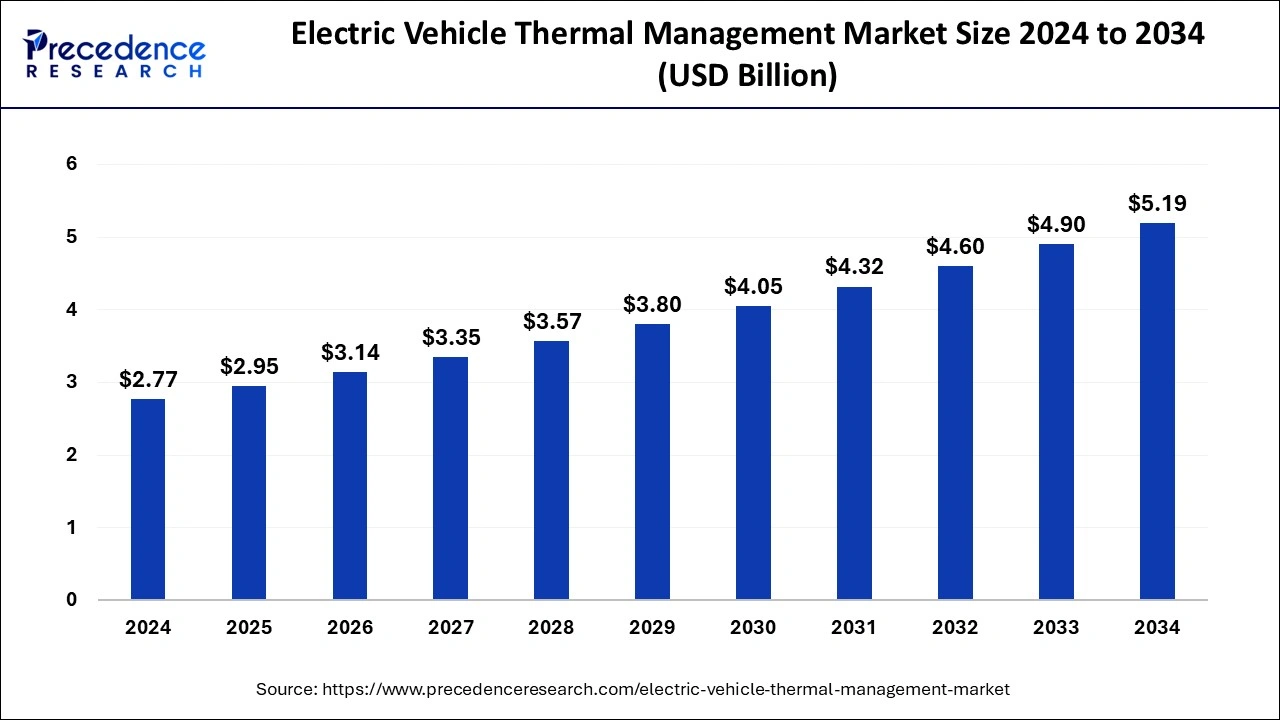The global electric vehicle thermal management market size reached USD 2.60 billion in 2023 and is anticipated to attain around USD 4.90 billion by 2033, growing at a CAGR of 6.54% from 2024 to 2033.
Key Points
- North America dominated the global electric vehicle thermal management market in 2023 with market share of 39%.
- Europe is expected to witness notable growth in the market over the forecast period.
- By system, the heating, ventilation, and air conditioning (HVAC) segment dominated the market in 2023.
- By system, the powertrain cooling segment is expected to grow at the highest CAGR in the market during the forecast period.
- By component, the motor segment has accounted market share of 47% in 2023.
- By component, the battery segment is expected to grow at a significant rate during the forecast period.
- By technology, the reduced HVAC system loading segment dominated the market in 2023.
- By technology, the active transmission warmup segment is expected to grow at the highest CAGR in the market during the forecast period.
- By application, the air condition segment dominated the market in 2023.
- By application, the engine cooling segment is expected to grow at the highest CAGR in the market during the forecast period.
- By vehicle type, the hybrid EV (HEV) segment dominated the market in 2023.
- By vehicle type, the plug-in hybrid EV (PHEV) segment is expected to grow at the highest CAGR in the market during the forecast period.

The Electric Vehicle Thermal Management Market is witnessing rapid growth driven by the increasing adoption of electric vehicles (EVs) globally. Thermal management systems play a critical role in ensuring the efficient operation and longevity of EV components, including batteries, motors, and power electronics. As the demand for EVs continues to rise, the market for electric vehicle thermal management solutions is expected to expand significantly in the coming years.
Get a Sample: https://www.precedenceresearch.com/sample/4069
Growth Factors:
Several factors contribute to the growth of the Electric Vehicle Thermal Management Market. One of the primary drivers is the increasing awareness of environmental sustainability and the need to reduce greenhouse gas emissions. Governments worldwide are implementing stringent regulations to curb vehicle emissions, incentivizing the adoption of electric vehicles. As EV manufacturers strive to enhance the performance and range of their vehicles, efficient thermal management systems become crucial for optimizing battery performance and ensuring safe operation.
Moreover, technological advancements in thermal management solutions, including liquid cooling, air cooling, and heat pumps, are driving market growth. These innovations enable EV manufacturers to improve energy efficiency, reduce charging times, and enhance overall vehicle performance. Additionally, the growing investments in research and development are leading to the development of advanced thermal management technologies tailored to the specific requirements of electric vehicles.
Region Insights:
The Electric Vehicle Thermal Management Market exhibits regional variations driven by factors such as regulatory environment, consumer preferences, and infrastructure development.
In North America, the United States and Canada lead the adoption of electric vehicles, driven by government incentives, environmental awareness, and supportive regulatory policies. The region’s well-established automotive industry and robust technological infrastructure create opportunities for the growth of the Electric Vehicle Thermal Management Market.
In Europe, countries like Germany, Norway, and the Netherlands are at the forefront of electric vehicle adoption, propelled by ambitious emissions targets and investments in charging infrastructure. European automakers are increasingly integrating advanced thermal management systems into their electric vehicle models to enhance performance and range, driving market growth in the region.
In Asia-Pacific, China is the largest market for electric vehicles, supported by government subsidies, infrastructure investments, and consumer demand for clean transportation solutions. Other countries in the region, such as Japan and South Korea, are also witnessing rapid growth in electric vehicle adoption, creating opportunities for thermal management solution providers to expand their presence in the market.
Electric Vehicle Thermal Management Market Scope
| Report Coverage | Details |
| Growth Rate from 2024 to 2033 | CAGR of 6.54% |
| Global Market Size in 2023 | USD 2.60 Billion |
| Global Market Size in 2024 | USD 2.77 Billion |
| Global Market Size by 2033 | USD 4.90 Billion |
| Largest Market | North America |
| Base Year | 2023 |
| Forecast Period | 2024 to 2033 |
| Segments Covered | By System, By Motor, By Technology, By Application and By Vehicle Type |
| Regions Covered | North America, Europe, Asia-Pacific, Latin America, and Middle East & Africa |
Electric Vehicle Thermal Management Market Dynamics
Drivers:
Several drivers are fueling the growth of the Electric Vehicle Thermal Management Market. One of the key drivers is the increasing demand for electric vehicles driven by environmental concerns, energy security, and technological advancements. Governments worldwide are offering incentives such as tax credits, rebates, and subsidies to encourage consumers to switch to electric vehicles, creating a favorable market environment for thermal management solution providers.
Moreover, the expanding electric vehicle charging infrastructure is driving market growth by addressing one of the key barriers to EV adoption: range anxiety. As the charging network continues to expand, EV drivers have greater confidence in the availability of charging stations, encouraging them to embrace electric vehicles. Thermal management systems play a vital role in optimizing charging processes, reducing charging times, and enhancing the overall efficiency of electric vehicle operations.
Opportunities:
The Electric Vehicle Thermal Management Market presents numerous opportunities for innovation, collaboration, and market expansion. One of the significant opportunities lies in the development of advanced thermal management solutions tailored to the evolving needs of electric vehicle manufacturers. Innovations such as phase change materials, thermal interface materials, and predictive thermal management algorithms can significantly enhance the performance, reliability, and safety of electric vehicles.
Furthermore, partnerships and collaborations between automakers, technology companies, and thermal management solution providers can accelerate the development and adoption of next-generation thermal management technologies. By leveraging each other’s expertise and resources, stakeholders in the electric vehicle ecosystem can address complex challenges and drive innovation across the value chain.
Additionally, the growing emphasis on sustainable transportation solutions presents opportunities for the integration of thermal management systems with renewable energy sources such as solar and wind power. By harnessing renewable energy for vehicle charging and thermal management processes, electric vehicle manufacturers can reduce their carbon footprint and enhance the sustainability of their operations.
Challenges:
Despite the opportunities presented by the Electric Vehicle Thermal Management Market, several challenges must be addressed to realize its full potential. One of the primary challenges is the high cost of advanced thermal management systems, which can pose a barrier to widespread adoption, particularly in price-sensitive market segments. To overcome this challenge, stakeholders need to focus on cost optimization strategies such as economies of scale, supply chain efficiency, and technological innovation.
Moreover, the complexity of integrating thermal management systems into electric vehicles poses technical challenges related to system design, compatibility, and reliability. Ensuring seamless integration and interoperability between thermal management components and other vehicle systems requires close collaboration between automotive engineers, thermal specialists, and technology suppliers.
Furthermore, the rapid evolution of electric vehicle technology and regulatory requirements adds uncertainty to the market landscape, creating challenges for stakeholders in terms of product development, compliance, and market forecasting. Continuous investment in research and development, regulatory engagement, and market intelligence is essential to stay ahead of the curve and address emerging challenges effectively.
Read Also: E-Fuel Market Size to Reach USD 645.90 Billion By 2033
Recent Developments
- In March 2024, Ford Motor Company launched an exploration of EVs with a wider range of varieties and refinements. The battery delivers up to 374 miles (600 km) range, topping the 311 miles Ford initially expected. Ford’s single-motor extended range explorer starts at £45,875 ($58,000) with a 77 kWh battery. The dual-motor version is equipped with VW’s 335 hp powertrain for its sporty GTX EVs.
- In February 2024, Nouveau Monde Graphite Inc. announced a parallel offtake agreement with Panasonic Energy, which, combined with GM’s Supply Agreement, covers approximately 85% of NMG’s planned active anode material production at its Phase-2 Bécancour Battery Material Plant.
- In January 2024, Melexis in Belgium launched its first MEMS pressure sensor using a new patented architecture called Triphibian. The triphibian MEMS pressure sensor, developed by Melexis, handles gas and liquid media measurements from 2 to 70 bar in a 16-pin SO16 package.
- In September 2023, Marelli launched new smart actuators for transmission and thermal management in EVs. These actuators are designed to simplify the actuation of complex vehicle functions. As future cars are expected to have over 100 actuators with different missions and purposes, this solution will help carmakers reduce complexity and ease the integration of vehicles’ mechanic and electronic environments.
- In September 2023, Informa Markets announced The Battery Show India, which was scheduled from 4th October to 6th October 2023. The Battery Show India was estimated to attract over 200 brands, 8000 trade visitors, and 50 speakers, including an impressive array of policymakers, decision-makers, influencers, technical experts, and professionals.
Electric Vehicle Thermal Management Market Companies
- Denso Corporation
- Valeo
- Dana Limited
- BorgWarner Inc.
- MAHLE GmbH
- Gentherm
- Informa Markets
- Robert Bosch GmbH
- LG Chem
- VOSS Automotive GmbH
- Modine Manufacturing Company
Segment Covered in Reports
By System
- Heating, Ventilation, and Air Conditioning (HVAC)
- Powertrain Cooling
- Fluid Transport
- Others
By Component
- Motor
- Battery
- Cabin Area
By Technology
- Active Transmission Warm-up
- Exhaust Gas Recirculation (EGR)
- Reduced HVAC System Loading
- Others
By Application
- Engine Cooling
- Air Condition
- Heated Steering
- Waste Geat Recovery
- Transmission System
- Heated/Ventilated Seats
- Others
By Vehicle Type
- Battery EV
- Hybrid EV (HEV)
- Plug-in Hybrid EV (PHEV)
By Geography
- North America
- Europe
- Asia-Pacific
- Latin America
- Middle East and Africa
Contact Us:
Mr. Alex
Sales Manager
Call: +1 9197 992 333
Email: sales@precedenceresearch.com
Web: https://www.precedenceresearch.com
